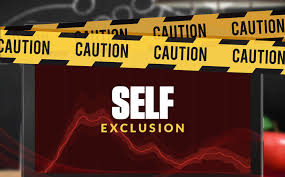Gambling addiction is a serious issue that affects millions of people worldwide, leading to financial ruin, strained relationships, and deteriorating mental health. As the gambling industry continues to grow, so does the need for effective tools to help those struggling with addiction.
Self-exclusion gambling has emerged as a powerful method for individuals to take control of their gambling habits and protect their well-being. Self-exclusion gambling is a voluntary program that allows individuals to ban themselves from participating in gambling activities for a specified period.
This article will explore the ins and outs of self-exclusion gambling, its benefits, challenges, and how it fits into the broader context of responsible gambling practices.
Skale Money Key Takeaways
- Self-exclusion gambling is a voluntary program that helps problem gamblers restrict their access to gambling activities.
- There are various types of self-exclusion programs, including casino-specific, online, and state-wide options.
- Self-exclusion offers numerous benefits, including financial protection and improved mental health.
- The process of self-exclusion involves several steps, from recognizing the need to implementing additional support measures.
- While effective, self-exclusion gambling has limitations and challenges that need to be addressed.
- Complementary approaches, such as therapy and support groups, can enhance the effectiveness of self-exclusion.
- Gambling operators play a crucial role in implementing and enforcing self-exclusion programs.
Table of Contents
Understanding Self-Exclusion Gambling
Self-exclusion gambling is a proactive approach that allows individuals to voluntarily ban themselves from participating in gambling activities. This tool is designed to help those who recognize they have a gambling problem and want to take decisive action to address it.
There are several types of self-exclusion programs:
- Casino-specific: Exclusion from a particular casino or group of casinos
- Online: Blocking access to online gambling platforms
- State-wide: Comprehensive exclusion from all gambling activities within a state or jurisdiction
How self-exclusion works in practice:
- The individual voluntarily enters into an agreement with gambling operators or regulatory bodies.
- Their personal information is added to a self-exclusion database.
- Gambling venues and online platforms are required to deny service to self-excluded individuals.
- Attempts to gamble during the exclusion period may result in forfeiture of winnings.
Key features of self-exclusion programs:
- Voluntary participation
- Specified duration (can range from months to lifetime)
- Legally binding agreement
- Removal from marketing lists
- Restricted access to gambling venues and platforms
- Support and resources for problem gambling
The Benefits of Self-Exclusion Gambling
Self-exclusion gambling offers numerous positive outcomes for individuals struggling with gambling addiction. By creating a barrier between the person and gambling activities, self-exclusion provides an opportunity for recovery and personal growth.
Benefits of self-exclusion gambling:
- Financial protection: Prevents further gambling losses and allows for financial recovery
- Mental health improvement: Reduces stress, anxiety, and depression associated with problem gambling
- Relationship preservation: Helps rebuild trust and repair damaged relationships
- Time management: Frees up time previously spent on gambling for productive activities
- Reduced gambling urges: Creates distance from triggers and helps break the habit
Before and After Self-Exclusion Scenarios:
| Aspect | Before Self-Exclusion | After Self-Exclusion |
| Financial stability | Frequent losses, debt | Improved savings, debt reduction |
| Mental health | Anxiety, depression | Reduced stress, better mood |
| Relationships | Strained, trust issues | Rebuilding trust, improved communication |
| Time usage | Excessive time gambling | More time for family, hobbies, work |
| Self-control | Difficulty resisting urges | Increased ability to manage impulses |
The Process of Self-Exclusion: Step-by-Step Guide
Engaging in self-exclusion gambling requires careful consideration and a commitment to change. The following steps outline the process of self-exclusion:
- Recognizing the need for self-exclusion • Acknowledge the negative impact of gambling on your life • Assess your readiness to make a change
- Researching available programs • Investigate local and online self-exclusion options • Understand the scope and limitations of each program
- Choosing the appropriate self-exclusion option • Consider the extent of your gambling activities (land-based, online, or both) • Decide on the duration of self-exclusion that best suits your needs
- Completing necessary paperwork • Gather required identification documents • Fill out self-exclusion forms accurately and thoroughly
- Understanding terms and conditions • Review the agreement carefully, including consequences of breaching self-exclusion • Ask questions if anything is unclear
- Implementing additional support measures • Seek counseling or join support groups • Install blocking software on devices to prevent online gambling
Advice for a successful self-exclusion process:
- Be honest with yourself and fully commit to the process
- Inform trusted friends or family members about your decision
- Remove gambling apps and unsubscribe from gambling-related marketing
- Develop a plan for managing finances and leisure time
- Stay connected with support systems throughout the exclusion period
Challenges and Limitations of Self-Exclusion Gambling
While self-exclusion gambling is an effective tool, it’s important to recognize its challenges and limitations:
- Enforcement issues: Reliance on staff to recognize self-excluded individuals
- Limited scope: May not cover all gambling options (e.g., informal betting)
- Temptation to circumvent: Some individuals may try to bypass the system
- Lack of uniform regulations: Varying rules across jurisdictions can create gaps
Common Challenges and Potential Solutions:
| Challenge | Potential Solution |
| Enforcement | Implement advanced ID verification systems |
| Limited scope | Advocate for comprehensive, multi-operator programs |
| Circumvention attempts | Increase penalties and improve detection methods |
| Regulatory inconsistencies | Push for standardized national or international frameworks |
Alternatives and Complementary Approaches to Self-Exclusion
While self-exclusion gambling is powerful, combining it with other methods can enhance its effectiveness:
- Therapy and counseling: Address underlying issues and develop coping strategies
- Support groups (e.g., Gamblers Anonymous): Share experiences and gain peer support
- Financial management tools: Implement budgeting software and spending limits
- Time-limiting software: Set restrictions on device usage for gambling-related activities
Advice: Combining self-exclusion with other approaches
- Create a comprehensive recovery plan that includes multiple strategies
- Regularly assess and adjust your approach as needed
- Seek professional guidance to tailor a program to your specific needs
- Stay committed to your chosen methods, even when facing challenges
The Role of Gambling Operators in Self-Exclusion Programs
Gambling operators play a crucial role in the success of self-exclusion gambling programs:
- Providing clear information about self-exclusion
- Implementing robust verification systems
- Training staff to recognize and assist self-excluded individuals
- Removing self-excluded individuals from marketing lists
Best practices for gambling operators in supporting self-exclusion:
| Practice | Description |
| Accessible information | Prominently display self-exclusion options on websites and in venues |
| Staff training | Regular, comprehensive training on identifying and assisting self-excluded individuals |
| Technology integration | Implement advanced systems to automate exclusion enforcement |
| Collaboration | Participate in multi-operator exclusion programs for broader protection |
| Responsible marketing | Ensure marketing efforts don’t target vulnerable or self-excluded individuals |
Legal and Regulatory Aspects of Self-Exclusion Gambling
The legal framework surrounding self-exclusion gambling varies across jurisdictions:
- Variations in laws across jurisdictions
- Enforceability of self-exclusion agreements
- Privacy and data protection concerns
- Penalties for non-compliance (both for operators and individuals)
Advice: Understanding your rights and responsibilities when self-excluding
- Research local gambling laws and regulations
- Read self-exclusion agreements carefully before signing
- Understand the consequences of breaching your self-exclusion
- Consider consulting with a legal professional if you have concerns
The Future of Self-Exclusion Gambling
As technology advances, so too will the methods for implementing and enforcing self-exclusion gambling:
- Biometric verification systems: Using facial recognition or fingerprints for identification
- Blockchain-based exclusion databases: Ensuring secure, tamper-proof records
- AI-powered early intervention tools: Identifying at-risk behavior before it escalates
- Cross-border and multi-operator exclusion programs: Providing comprehensive protection
Current vs. Future State of Self-Exclusion Gambling:
| Aspect | Current State | Future State |
| Identification | Manual checks, ID cards | Biometric verification |
| Data management | Centralized databases | Blockchain-based systems |
| Intervention | Reactive measures | AI-powered predictive tools |
| Scope | Often limited to single operators or jurisdictions | Global, cross-platform protection |
Conclusion
Self-exclusion gambling stands as a vital tool in the fight against gambling addiction. By providing individuals with a means to restrict their access to gambling activities, self-exclusion offers a path to recovery and renewed control over one’s life.
While challenges remain, the continued development of self-exclusion programs, coupled with advances in technology and increased awareness, promises a future where those struggling with gambling addiction have stronger support systems in place.
For those considering self-exclusion, remember that taking this step is a sign of strength, not weakness. It’s a proactive measure to protect your financial and mental well-being. If you or someone you know is struggling with gambling addiction, don’t hesitate to explore self-exclusion options and seek additional support from professionals and support groups.
As we move forward, it’s crucial that all stakeholders – from individuals and families to gambling operators and regulators – work together to enhance the effectiveness of self-exclusion gambling programs. By doing so, we can create a safer gambling environment and provide better protection for those vulnerable to addiction.
FAQs About Self-Exclusion Gambling
How long does self-exclusion last?
The duration of self-exclusion can vary, typically ranging from six months to lifetime bans. The length is often chosen by the individual during the self-exclusion process.
Can I cancel my self-exclusion before the end date?
Generally, self-exclusion cannot be canceled before the agreed-upon end date. This ensures the effectiveness of the program.
Does self-exclusion cover all types of gambling?
The scope of self-exclusion depends on the program. Some cover specific venues or websites, while others may be state-wide or cover multiple operators.
What happens if I try to gamble while self-excluded?
Attempts to gamble while self-excluded may result in removal from the premises, forfeiture of winnings, and potential legal consequences.
Will self-exclusion affect my credit score?
Self-exclusion itself does not directly affect your credit score. However, it may impact your ability to obtain credit from gambling-related businesses.
Is my self-exclusion confidential?
Yes, self-exclusion information is typically kept confidential and only shared with relevant staff and operators for enforcement purposes.
Can I self-exclude on behalf of a family member?
In most cases, self-exclusion must be initiated by the individual themselves. However, some jurisdictions may allow family-initiated exclusion under specific circumstances.
Author: Cosmas Mwirigi
Cosmas Mwirigi is an established freelance writer with over five years of experience and the founder of Skalemoney.com. Cosmas Mwirigi has been published on PV-Magazine, Slidebean, Bridge Global, Casinos.com, Gambling.com, and Reverbico among many other websites.
Cosmas Mwirigi is an expert writer in iGaming, B2B, SaaS, Finance, digital marketing and Solar renewable energy. To contact him for his services, connect with him on his LinkedIn
![]()




